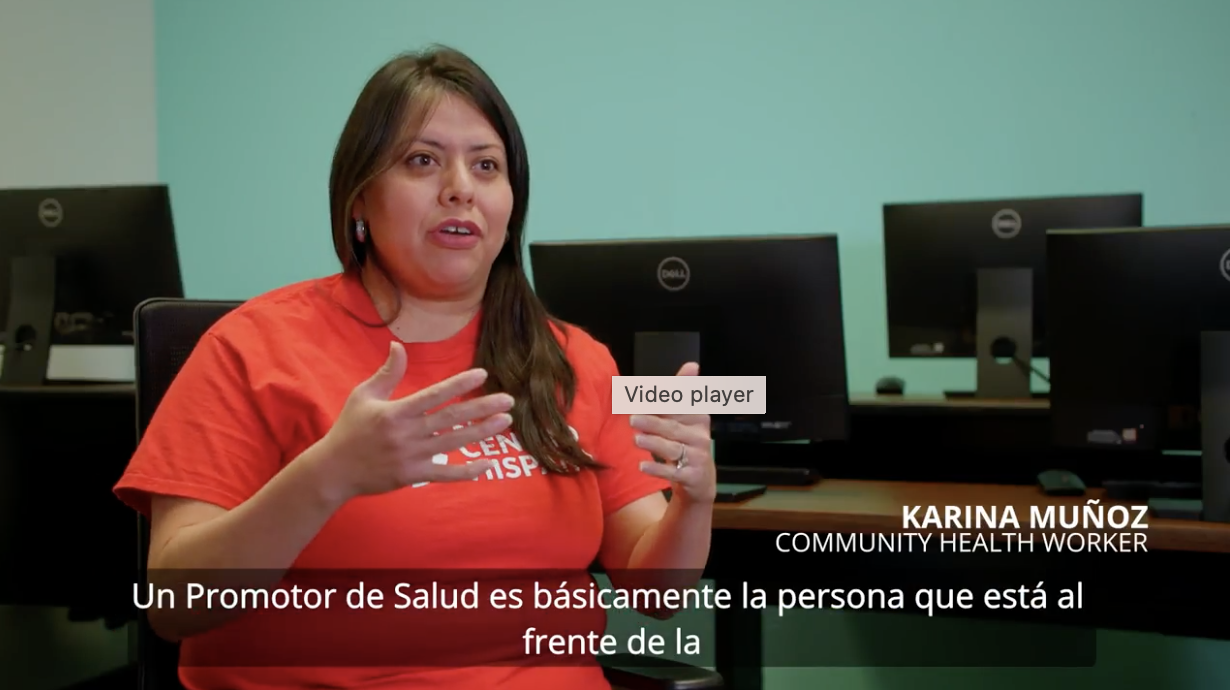Bridging Community and Systems for Better Health and Well-Being
Community Health Worker Integration into Primary Care Advanced Medical Homes
Community Health Worker (CHW) services and programs are crucial in helping Advanced Medical Homes improve chronic disease self-management and health outcomes, enhance the patient experience, reduce emergency room utilization and hospital readmissions, as well as overall healthcare costs.
View the videos below to hear directly from Community Health Workers and healthcare providers working in NC about the important role that CHWs play in improving individual and community health.
 Promo Video: View via Google | View on YouTube |
 Case Study Video: View via Google | View on YouTube |
 Duke Story: View via Google | View on YouTube |
 El Centro Hispano Story: View via Google | View on YouTube |
The NC AHEC Community Health Worker (CHW) Program supports the development of a qualified and sustainable CHW workforce well equipped to advance the health of all North Carolinians. While NC AHEC serves as an anchor partner in the NC CHW Initiative, the NC DHHS Office of Rural Health serves as the lead agency. For more information about our work, contact Cathryn Chandler at cathryn.chandler@mahec.net.
NC AHEC Practice Support is available in partnership with NC DHHS Division of Health Benefits. Practice Support coaches are able to support primary care practices interested in adding CHWs to their teams or optimizing existing CHW programs. This service is available at no charge to your practice. Contact us via email at practicesupport@ncahec.net to seek assistance.
CHW Workforce Training & Support
CHW INTEGRATION & OPTIMIZATION TOOL
This tool is an evidence-informed comprehensive resource that includes a gap analysis, implementation resources, and a project management plan for integrating new or optimizing existing CHW programs in Advanced Medical Home settings. NC AHEC Practice Support coaches are able to assist you with the use of this tool as part of your CHW optimization efforts. For more information, please contact practicesupport@ncahec.net.
The tool was developed with support from the NC DHHS Division of Health Benefits, NC AHEC, and the Rita and Alex Hillman Foundation.
NC CORE COMPETENCY TRAINING
This training is offered through the NC Community College System and is required for CHW Certification in North Carolina. Learn more by visiting NCCHWA Training.
CHW SPECIALTY TRAINING
NC AHEC, as an anchor partner in the NC CHW Initiative, is committed to ensuring that Community Health Workers have access to ongoing training and professional development resources. As a vital workforce for advancing health outcomes, it is important that CHWs are able to deepen their knowledge and sharpen their skills for providing all North Carolinians with the opportunity for health and wellness. Through funding provided by the NC DHHS Department of Health Benefits (Medicaid), NC AHEC has worked with other key stakeholders, including CHWs and CHW supervisors, to develop standards for CHW Specialty training, identify key training topics, and develop a series of online modules specifically geared towards preparing CHWs to partner with primary care practices as part of the new Medicaid Managed Care network.
Each module provides continuing education credit recognized by the NC CHW Association for the purposes of maintaining certification. Some modules stand alone in terms of the topic covered while others can be combined to deepen CHW knowledge and skills on a particular topic. Each module has been co-developed with CHWs to ensure the focus of learning and style of education reflects CHW culture and real-life scenarios. This module is divided into sections focusing on an overview of NC Medicaid and Medicaid Managed Care, the role of CHWs in Medicaid Managed Care, and the role of CHWs in client advocacy.
CHW INTEGRATION INTO ADVANCED MEDICAL HOMES
NC AHEC has developed self-paced online specialty training programs to prepare CHWs and practices for CHW integration into primary care as part of Medicaid Managed Care. This service is also supplemented with Practice Support coaches with expertise in CHW optimization within your practice or Advanced Medical Home. Click on the button below to view and register for both English and Spanish CHW Specialty Training Programs, available at no cost and with educational credits.
MONTHLY CHW PEER LEARNING COLLABORATIVES
Empowering Connections for Community Health Workers 2024-2025
This zoom-based webinar is geared towards Community Health Workers throughout North Carolina. It is a free webinar that provides continuing education, networking and sharing your successes in your programs. This webinar has been running for three years online on the third Thursday of the month. We ask you to register for this whole series. This webinar series is funded by North Carolina Area Health Education Centers Program Office (NC AHEC) a partner supporting the NC CHW Initiative (NC CHW) at the state level in collaboration with the NC Office of Rural Health (NC ORH) and other stakeholders.
Objectives:
+ To build a collaborative peer learning environment for Community Health Workers
+ To provide resources that can improve access to healthcare services
+ To increase engagement of community health workers using statewide platforms and decrease barriers with client referrals for meeting social determinants of health needs
+ To increase health knowledge and self-sufficiency through a range of activities such as outreach, community education, informal counseling, and social support and advocacy
+ To network and get support for CHW programs
.
Resources for Effective CHW Integration
CHW INTEGRATION WEBINAR sERIES
This series of webinars seeks to build awareness and understanding in a wide audience across the state about Community Health Workers (CHW) and CHW program models that can inform and benefit CHW integration strategies and activities in NC. There is a lot of strong and impactful CHW integration work going on in NC and across the country. As a state, we are in the early phases of spreading and scaling CHW integration. It is important that we learn from those who have been leading this work to ensure that NC’s CHW integration approaches effective, sustainable and impactful.
UPCOMING WEBINARS





